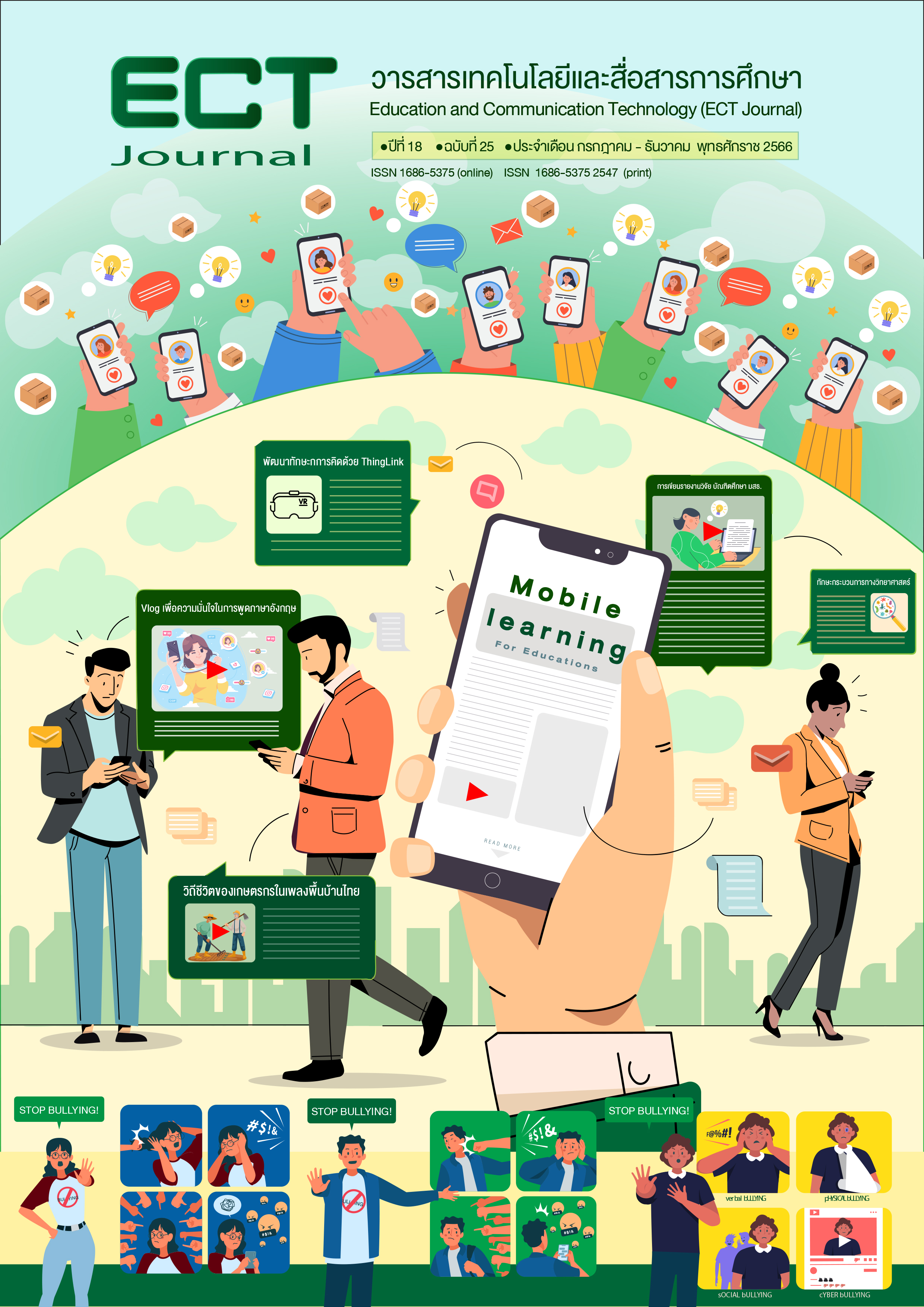Effect of Using Inquiry-Based Mobile Learning Application Package with Endoscope Camera to Enhance Upper Elementary Students’ Science Process Skills
Keywords:
mobile learning application package, endoscope camera, science process skillsAbstract
The purpose of this research was to study the use of inquiry-based mobile learning application package with endoscope camera to enhance upper elementary students’science process skills.The samples were 32 fifth grade students using
a purposive sampling method. The experimental period lasted 8 weeks. The experimental instruments were mobile learning application package, lesson plan, scoring science process skills rubrics and questionnaire of student’s satisfaction. The data were analyzed by using frequency, mean, standard deviation and One-Way Repeated Measure ANOVA analysis.
The results showed that the samples had science process skill score difference at the .05 level of significance. The result of students’ satisfaction showed that the web application package with endoscope camera was very satisfied.
References
กระทรวงศึกษาธิการ. (2560). ตัวชี้วัดและสาระการเรียนแกนกลาง กลุ่มสาระการเรียนรู้วิทยาศาสตร์ (ฉบับปรับปรุง 2560) ตามหลักสูตรแกนกลางการศึกษาขั้นพื้นฐาน พุทธศักราช 2551. ชุมนุมสหกรณ์การเกษตรแห่งประเทศไทย.
ชนินันท์ พฤกษ์ประมูล. (2557). การประเมินทักษะกระบวนการทางวิทยาศาสตร์. สุทธิปริทัศน์, 28(86), 352-364.
ทิศนา แขมมณี. (2563). ศาสตร์การสอน: องค์ความรู้เพื่อการจัดกระบวนการเรียนรู้ที่มีประสิทธิภาพ (พิมพ์ครั้งที่ 24). สำนักพิมพ์แห่งจุฬาลงกรณ์มหาวิทยาลัย.
พิมพันธ์ เดชะคุปต์ และพเยาว์ ยินดีสุข. (2548). วิธีวิทยาการสอนวิทยาศาสตร์ทั่วไป. พัฒนาคุณภาพวิชาการ.
สถาบันส่งเสริมการสอนวิทยาศาสตร์และเทคโนโลยี. (2560). คู่มือการใช้หลักสูตรรายวิชาพื้นฐานวิทยาศาสตร์ กลุ่มสาระการเรียนรู้วิทยาศาสตร์ (ฉบับปรับปรุง พ.ศ.2560) ตามหลักสูตรแกนกลางการศึกษาขั้นพื้นฐาน พุทธศักราช 2551 ระดับประถมศึกษา. http://scimath.org/e-books/8922/flippingbook/index.html
สถาบันส่งเสริมการสอนวิทยาศาสตร์และเทคโนโลยี. (2562). คู่มือครูรายวิชาพื้นฐานวิทยาศาสตร์ชั้นประถมศึกษาปีที่ 5 เล่ม 2. https://www.scimath.org/e-books/10946/flippingbook/index.html
สมเกียรติ พรพิสุทธิมาศ. (2551). การสอนวิทยาศาสตร์โดยเน้นทักษะกระบวนการ. ก้าวทันโลกวิทยาศาสตร์, 8(2), 28-38.
Baharom, M. M., Atan, N. A., Rosli, M. S., Yusof, S., & Hamid, M. Z. A. (2020). Integration of Science learning Apps based on Inquiry Based Science Education (IBSE) in enhancing Students Science Process Skills (SPS). International Journal of Interactive Mobile Technologies, 14(9), 95-109. https://doi.org/10.3991/ijim.v14i09.11706
Choirunnisa, N. L., Prabowo, P., & Suryanti, S. (2018). Improving Science Process Skills for Primary School Students Through 5E Instructional Model-Based Learning. Journal of Physics: Conference Series, 947, 12-21. https://doi.org/10.1088/1742-6596/947/1/012021
Duruk, U., Akgün, A., Doğan, C., & Gülsuyu, F. (2017). Examining the Learning Outcomes Included in the Turkish Science Curriculum in Terms of Science Process Skills: Document Analysis with Standards-Based Assessment. International Journal of Environmental & Science Education, 12(2), 117-142.
Ekici, M., & Erdem, M. (2020). Developing Science Process Skills through Mobile Scientific Inquiry. Thinking Skills and Creativity, 36, Article 100658. https://doi.org/10.1016/j.tsc.2020.100658
Fleck, B., Beckman, L., Sterns, J. L., & Hussey, H. D. (2014). YouTube in the Classroom: Helpful Tips and Student Perceptions. The Journal of Effective Teaching, 14(3), 21-37. http://www.uncw.edu/cte/et
Juniper, A. (2020, March 4). The best borescopes and inspection cameras in 2021. Digital Camera World. https://www.digitalcameraworld.com/buying-guides/the-best-borescopes-and-inspection-cameras-in-2020
Khery, Y., Nufida, B., Suryati, S., Rahayu, S., & Budiasih, E. (2020). The influence of mobile learning with oriented NOS to students learning performances. In Journal of Physics: Conference Series. (pp. 1567). Indonesia. https://doi.org/10.1088/1742-6596/1567/4/042033
Parveen, Z. (2017). Educational effectiveness of the 5E model for scientific achievement of students with hearing impairment. Journal of Baltic Science Education, 16(5), 723-732. http://oaji.net/articles/2017/987-1509214017.pdf
Rice, P., Beeson, P., & Blackmore-Wright, J. (2019). Evaluating the Impact of a Quiz Question within an Educational Video. TechTrends, 63, 522-532. https://doi.org/10.1007/s11528-019-00374-6
Suduc, A.-M., Bizoi, M., & Gorghiu, G. (2015). Inquiry Based Science Learning in Primary Education. Procedia - Social and Behavioral Sciences, 205, 474-479. https://doi.org/10.1016/j.sbspro.2015.09.044
Suryaningsih, T., & Ruslih, F. (2020). Mastery of Concepts, Scientific Attitudes, and Science Process Skills in Inquiry-based Learning in the 5th Grade. Journal of Madrasah Ibtidaiyah Education, 4(2), 248-260. https://doi.org/10.32934/jmie.v4i2.191
Suryanovika, C. (2020). Google Forms: An Assessment Tool Accommodating the Generation-Z Students' Learning Needs. E-Structural, 2(2), 140-152. https://doi.org/10.33633/es.v2i2.3257
Webber, S. (2020, January 20). NHBS In the Field -- Video Endoscope. NHBS. https://www.nhbs.com/blog/nhbs-in-the-field-video-endoscope
Widiyanti, F., Indriyanti, D. R., & Ngabekti, S. (2015). The effectiveness of the application of scientific literacy-based natural science teaching set toward the students' learning activities and outcomes on the topic of the interaction of living organism and environment. Journal Pendidikan IPA Indonesia, 4(1), 20-24. https://doi.org/10.15294/jpii.v4i1.3496
Downloads
Published
How to Cite
Issue
Section
License
Copyright (c) 2023 มหาวิทยาลัยสุโขทัยธรรมาธิราช

This work is licensed under a Creative Commons Attribution-NonCommercial-NoDerivatives 4.0 International License.
1. ทรรศนะและข้อคิดเห็นใด ๆ ที่ปรากฏอยู่ในวารสาร ECT Education and Communication Technology Journal เป็นของผู้เขียนโดยเฉพาะ สำนักเทคโนโลยีการศึกษา มหาวิทยาลัยสุโขทัยธรรมาธิราช และกองบรรณาธิการไม่จำเป็นต้องเห็นพ้องด้วย
2. กองบรรณาธิการของสงวนลิขสิทธิ์ในการบรรณาธิการข้อเขียนทุกชิ้น เพื่อความเหมาะสมในการจัดพิมพ์เผยแพร่






